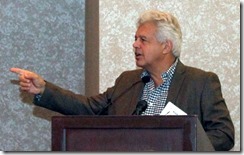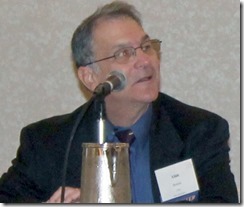See also Seattle Smart Gun Symposium part 1, Seattle Smart Gun Symposium part 2, and Smart Gun Symposium in the news.
Robert McNamara
Co-Founder, Trigger Smart
McNamara and Trigger Smart are based in Ireland. This, as he admitted, biased his views on “smart guns” in the U.S.
His technology is RFID (Radio Frequency Identification) based and he told us it would add about $300 to the price of a gun.
He saw them as being used for prevention of children having an accident and used for recreational firearms. He didn’t seem to have a sense for what it would mean to have his technology on a self-defense gun.
As King County Sheriff John Urquhart pointed out police officers who lose control of their gun are almost for certain going to be close enough for the gun to be authorized to shoot when the bad guy pulls the trigger. If the bad guy were to run some distance away before shooting then it would be useful but in the immediate struggle it wouldn’t help. Hence an RFID based authorization system is of limited value in a struggle for self-defense situation.
He seemed to think there were some people that wanted them banned. It could be that he was just misunderstanding the situation with the New Jersey mandate and how that would essentially ban other types of gun. Hence many gun owners are hostile to the introduction of “smart guns”.
Since it is dependent upon radio communication someone in the audience asked about how it would deal with an attempt at being jammed. He didn’t seem to think it was possible. Looking at his bio I can excuse this error. His background is in property development, construction, and real estate. As an electrical engineer I can assure you it is possible to jam the communication between the gun and the RFID tag worn by the shooter.
Loretta Weinberg
New Jersey State Senator Majority Leader
Weinberg takes credit for the introduction and passage of the New Jersey “smart gun” mandate law.
She told many stories of children accidently shooting people. Her keynote speech was emotion packed and got the expected response from the CeaseFire people in the audience. I was annoyed with this because the number of people accidently killed in this manner is much less than the number of small children drowned. But we don’t have symposiums on or laws mandating “smart bathtubs” or “smart swimming pools”.
But what really irritated me was when she said it might have prevented the Sandy Hook elementary school shooting or the terrorist shooting in France at the offices of Charlie Hebdo. To believe things like that requires a special kind of crazy. I doubt Weinberg actually believes such a thing. I suspect she is just exhibiting her credentials that enabled her to be a New Jersey politician for such a long time. She can lie convincingly when telling people what they want to hear. She was speaking to the CeaseFire audience and not to people with technical competence.
She said there was a lot of talk among gun control people about the “smart gun” mandate law. The law had the unintended consequence of stopping the research. And you find that CeaseFire is opposed to the mandate and the Brady Campaign tried to sue and get New Jersey to enforce the mandate.
She wrote a letter to the NRA saying that she would work to repeal the law if the NRA would stop the opposition to “smart guns”. They didn’t respond. This got groans from the CeaseFire people in the audience. I thought this was probably the smartest thing they could have done with the letter. Anti-gun people can’t be trusted. What sort of guarantee could we have in place that would prevent them from pushing for a mandate again as soon as there is a gun on the market that sort of works but makes self-defense more risky than it already is? There isn’t any.
Judith Leftwich
Legal Director, Law Center to Prevent Gun Violence
When asked by moderator Dave Ross, “Is there anything wrong with letting the market decide?” Leftwich made it clear she supports mandates. When asked about the legality of mandates in light of the Heller decision which said the D.C. safe storage law was unconstitutional she told the audience that Heller only required that guns be functional. A safe storage law, in general, was not unconstitutional. D.C. had required the guns be disassembled. A “smart gun” should pass constitutional muster. Her questioner (someone from Guns.com, I think it was Max Slowik, their report is here) followed up by pointing out that Heller said that firearms “in common use” could not be banned. Leftwich drew parallel to seat belts and air bags in cars and said you can still drive old cars without airbags or seat belts. Guns shouldn’t be any different.
Leftwich also said “smart guns” would prevent gun theft. I so wanted to ask the other panelists who actually had technical knowledge what their opinion was. But there were other people asking questions ahead of me and the answers rambled on for so long that they put a halt to the questions before I got my turn. I told her directly after the symposium that the technology couldn’t possibly stop someone with a little mechanical or electrical smarts from defeating it. She responded that thieves generally aren’t very smart. I pointed out that they could still sell the guns to someone who had the smarts. She insisted that it would still help some. I told her that the mandate will get extremely strong resistance because of the self-defense issues of reduced reliability. I don’t know if I was just starting to annoy her or if it was that particular question but her attitude changed and she didn’t seem at all interested in talking to me any more. I let it drop.
In part four I will cover the “smart gun” poll results presented by Mark Burles, Vice President Penn Schoen, Berland.
I received fairly detailed information on the testing of the Dynamic Grip Recognition technology. I don’t yet have permission to publish it here. I hope to get at least permission to say which of my concerns have been addressed to my satisfaction and which I think need more work. That permission probably will not be granted until Monday, if ever.




